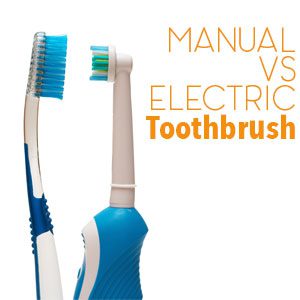Simply brushing your teeth twice a day isn’t all you have to do to maintain a healthy smile. Caring for your unique set of chompers is a task that comes with a set of instructions as personalized as your smile. Having the right tools is also important. So, which toothbrush is best for you?
If you’re considering an electric toothbrush or wonder if your manual toothbrush is doing everything you need it to do, here’s a breakdown of what you should consider before switching.
The Manual Toothbrush
If you’re like most people, you use the free toothbrush you get from your dentist every six months. Or perhaps you buy a special one at the grocery store that has the tongue brusher you love. Whatever your preference, if you don’t have any special dental needs, these are usually good at getting the job done when it comes to brushing. Just make sure you replace it every few months and that you’re getting a size and bristle strength that fits your needs.
The Electric Toothbrush
We get questions about these guys a lot. A patient gets a cavity, and wants to know if switching to an electric toothbrush will help prevent them. Let us start by saying that an electric toothbrush won’t solve problems related to not brushing thoroughly or long enough, or skipping out on flossing. So first make sure you’re doing everything you can to keep your teeth clean and healthy.
If you feel like you are doing all in your power, an electric toothbrush can help you out. Here’s when we think an electric toothbrush can benefit you.
- Kids who have trouble brushing long enough – get one with a timer.
- Crooked or misaligned teeth – get around those gaps and grooves better.
- Wisdom teeth – if they don’t need to be pulled, brushing them can be difficult.
- Excessive plaque build up.
- Injuries and arthritis – get more leverage with an electric toothbrush.

